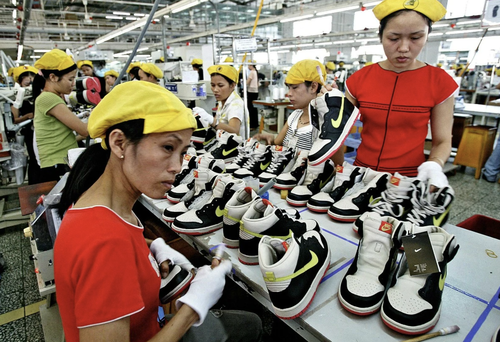“Friendshoring” Trend Sees Companies Moving Ops To Dodge Tensions And Trade Wars
Wary of mounting tensions surrounding out-of-favor countries like China and Russia, multinational corporations are shifting operations to places that present less geopolitical risk.
The trend has been labelled “friendshoring.” While that’s a play on “offshoring,” this isn’t about companies moving operations back to the United States or Europe, but rather seeking foreign alternatives that retain the benefit of low labor costs but with less international controversy.
For now, the conversation is principally about China. “Every company that I speak to at the moment is engaged in rethinking their [China-focused] supply chains,” Tony Danker, head of the Confederation of British Industry, told the Financial Times, “because they anticipate that our politicians will inevitably accelerate towards a decoupled world from China.”
Vietnamese workers on a Nike production line near Ho Chi Minh City (AP/Richard Vogel)
Congress is actively working to accelerate the friendshoring trend: The $433 billion climate and tax bill that’s grinding toward Senate approval includes a tax credit for electric vehicles assembled in North America — not just the United States. That’s sparked some grumbling from the omitted EU.
China and the United States already had an increasingly adversarial relationship before this week’s saber-rattling over House speaker Nancy Pelosi’s visit to Taiwan. A long-simmering trade war heated up on on June 21, when the Uyghur Forced Labor Prevention Act (UFLPA) started imposing a guilty-til-proven-innocent regime that bars all imports from China’s Xinjiang province unless businesses prove their products are not made with forced labor.
Geopolitical and trade-war tensions aren’t the only factor pushing multinationals away from China. The country’s over-the-top zero-Covid policies have disrupted supply chains, and China has been known to target foreign companies in a variety of ways, to include encouraging Chinese consumer boycotts of businesses that have somehow managed to earn the Chinese government’s ire.
Demographics are a factor too. The youngest generation is the country’s most-educated ever, and there’s a growing stigma attached to vocational schooling and factory work — a dynamic that puts upward pressure on labor costs. Gen Z Chinese are also increasingly gravitating toward working for the government or state-run companies.
None of this is to suggest multinationals will abandon China altogether. For many, this is an exercise in diversifying risks. Those calculations are made more difficult by uncertainty over who may fall out of favor with reckless, sanction-happy Western governments in the future.
There could be a downside for consumers: To the extent friendshoring moves some operations to places more expensive than China, the trend could nudge prices higher.
A Rabobank analysis of friendsharing projects that chief beneficiaries will include countries like Vietnam, India, Brazil, Bangladesh, Indonesia, Mexico, Turkey, Egypt and South Africa. However, expect both Eastern and Western European countries will be in on the action too — with the latter most likely to see new high-tech presences.
Foreign Policy provides examples of some recent corporate moves:
Apple has begun moving manufacturing from China to Vietnam, where its AirPods Pro 2 are now likely to be produced. Two years ago, Samsung moved its Chinese manufacturing to Vietnam. Hasbro has moved its Chinese production to India and Vietnam. In July, Volvo announced that it would open its first European factory in 60 years, in Slovakia. (The Swedish carmaker is owned by Geely of China.) Apparel and footwear companies such as Adidas, meanwhile, have shifted production to Vietnam, though this was primarily motivated by cost.
Friendshoring beneficiaries have to perform their own careful calculations. As Alan Beattie notes at the Financial Times, “Few countries will want to be an immutable part of a U.S. friendshoring gang if it opens them up to strategic and commercial retribution from Beijing.”
Tyler Durden
Thu, 08/04/2022 – 20:40

